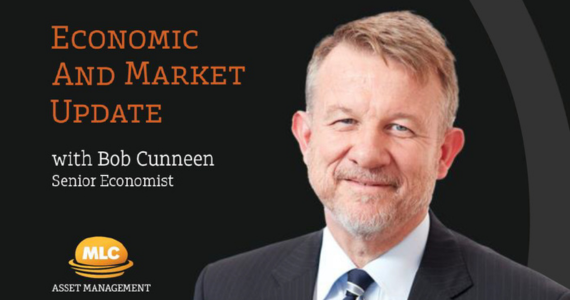Key events in December 2024
- Global share prices fell in December given fading hopes for US interest rate cuts in 2025. Concerns over the intensifying conflicts in the Middle East and Ukraine also provided a headwind to global share prices. The sharp fall in the Australian Dollar mitigated this negative share performance, allowing global shares (unhedged) to make a strong gain in December.
- Wall Street share prices declined from their historic highs given persistent inflation and strong US economic activity data. US consumer inflation came in at 2.7% in the year to November which was the highest in the past five months. While the US central bank cut interest rates by 0.25% in December, the Federal Reserve (FED) raised their inflation and interest rate forecasts for 2025.
- Chinese shares made solid gains with the government’s assurances that China’s economic growth will meet their 5% growth target even with the property sector’s woes. Japanese shares made strong gains with the central bank holding interest rates steady and a weakening currency.
- Australian shares fell given a more cautious assessment on the prospect for lower interest rates in both Australia and globally. The real estate sector led the falls given their sensitivity to interest rates. There were also sharp falls for the previously strong performers in the financial sector shares and information technology. There were only modest pockets of gains in the consumer staples and utilities sectors.
- Australia’s subdued economy was confirmed with the September quarter’s weak GDP result. Australia’s economy expanded by only 0.3% in the September quarter and 0.8% for the past year. In more encouraging news, there is strong jobs growth and a low unemployment rate of 3.9% with the benefit of government health and infrastructure spending. The Reserve Bank of Australia (“RBA”) also appears more open to cutting interest rates in 2025 given the “softer than expected” Australian economic activity and recent milder inflation results.

Asset class summary
Asset class returns in Australian dollars – periods to 31 December 2024
| CYTD
% |
1 month
% |
3 months
% |
1 year
% |
3 years
pa % |
5 years
pa % |
10 years
pa % |
|
| Australian shares | 11.4 | –3.1 | –0.8 | 11.4 | 7.1 | 8.0 |
8.5 |
| Global shares (hedged) | 19.5 | –1.7 | 1.2 | 19.6 | 5.7 | 9.5 |
9.5 |
| Global shares (unhedged) | 29.4 | 2.7 | 10.9 | 29.5 | 11.2 | 12.9 |
12.3 |
| Emerging markets (unhedged) | 18.4 | 5.1 | 3.1 | 18.5 | 3.5 | 4.3 |
6.6 |
| Australian property securities | 17.6 | –5.8 | –6.1 | 17.6 | 3.2 | 6.0 |
8.6 |
| Global property securities (hedged) | 2.8 | –6.4 | –7.5 | 2.8 | –5.6 | –1.4 |
2.6 |
| Global listed infrastructure (hedged) | 12.0 | –5.1 | –3.4 | 12.1 | 2.1 | 2.9 |
5.9 |
| Australian bonds | 2.9 | 0.5 | –0.3 | 2.9 | –0.8 | –0.2 |
2.0 |
| Global bonds (hedged) | 2.2 | –0.9 | –1.2 | 2.2 | –1.9 | –0.5 |
1.8 |
| Global high yield bonds (hedged) | 5.4 | –0.6 | –0.4 | 5.4 | 0.8 | 2.5 |
4.4 |
| Australian inflation-linked bonds | 2.2 | 0.2 | –0.4 | 2.2 | 1.9 | 2.3 |
2.6 |
| Cash | 4.5 | 0.4 | 1.1 | 4.5 | 3.2 | 2.0 |
1.9 |
| AUD/USD | –9.3 | –5.0 | –10.8 | –9.3 | –5.2 | –2.5 |
–2.8 |
Past performance is not a reliable indicator of future performance
Sources: Australian shares – S&P/ASX 300 Total Return Index; Global shares (hedged) – MSCI All Countries World (A$ hedged, Net); Global shares (unhedged) – MSCI All Countries World in A$ (Net); Emerging markets – MSCI Emerging Markets in A$ (Net); Australian property securities – S&P/ASX 300 A-REIT Accumulation Index; Global property securities – FTSE EPRA/NAREIT Developed (A$ hedged, Net); Global listed infrastructure – FTSE Global Core Infrastructure 50/50 (Hedged $A); Australian bonds – Bloomberg AusBond Composite 0+ Yr Index; Global bonds (A$ hedged) – Barclays Global Aggregate (A$ hedged, Gross); Global high yield bonds (A$ hedged) – Barclays US High Yield Ba/B Cash Pay x Financials ($A Hedged); Australian inflation-linked bonds – Bloomberg AusBond Inflation Government 0+ Yr Index; Cash – Bloomberg AusBond Bank Bill Index; AUD/USD – WM/Reuters Daily (4 pm GMT).)
Key events in global markets over the last three months to December 2024
Global shares (hedged) increased by 1.2% over the quarter given persistent inflation and fading hopes for US interest rate cuts over the coming year. Concerns over the escalating conflicts in the Middle East and Ukraine also weighed on share prices. Global shares (unhedged) recorded an exceptionally strong 10.9% return given the sharp decline in the Australian dollar.
Wall Street’s benchmark S&P 500 Index made historic highs and delivered a solid 2.3% quarterly return in local currency terms. The exuberant optimism on Artificial Intelligence (AI) and technology shares are the tailwind behind Wall Street’s ascent. Donald Trump’s election as the next US President in November is also seen as positive for US shares given the potential for lower corporate taxes and extension of personal tax rate cuts.
European shares disappointed with a negative return despite lower inflation and the European Central Bank (ECB) cutting interest rates. Slow economic growth and modest corporate profits are weighing on Europe.
Asian share markets delivered mixed performances. Chinese shares have slipped back in the past three months after an extraordinary recovery in September. Investors have once again become cautious about China’s prospects given the struggling property market. However, Japanese share markets have made strong gains given that the Japanese central bank has paused on raising interest rates in recent months.
Global bonds (hedged) posted a weak -1.2% quarterly return. More persistent inflation in the United States and a more cautious outlook for 2025 from the US central bank has diminished expectation for lower interest rates in 2025. Australian bonds delivered a weak return (-0.3%) given a more cautious assessment of the prospects for lower global interest rates in the coming year.
Key events in Australia over the last three months to December 2024
Australian shares delivered a weak quarterly return of -0.8%. The resources sector was the weakest link with a disappointing -11.2% return given more concern over China’s growth prospects which resulted in lower commodity prices. There was also a disappointing return of -6.1% for property securities given higher bond yields. There were some pockets of strength with solid gains for financial sector shares (5.9%), industrials (3.2%) and communication services (2.2%). However, these gains were not enough to compensate for the broader market weakness.
Australia’s economy continued to display subdued economic activity. The negative impact of high consumer prices, mortgage interest rates and rents continued to squeeze budgets. Australia is regrettably in a ‘per capita’ recession where annual population growth was greater than economic growth in the year to September. Yet there has been some more encouraging news in terms of solid jobs growth and milder inflation. Australia’s annual inflation rate declined to 2.1% in October. This moderation in price rises reflects the benefit of government electricity subsidies. According to the Australian Bureau of Statistics, “Electricity prices fell 35.6% in the 12 months to October”1. Given the “softer than expected” Australian economic activity and milder inflation results, the RBA appears more open to cutting interest rates in 2025 judging by their commentary from the December 2024 meeting.
Global prospects
Global share prices made very strong gains in 2024 despite some challenges. The enthusiasm for AI and technology were the key factors supporting global rising share prices. There was also confidence that with inflation gradually falling across the world, central banks would make further cuts to interest rates. A lower interest rate environment should be more supportive of corporate profits and thereby share prices in the long run.
However, these exuberant expectations may be challenged by considerable global political risks in 2025 with the continuing Russian-Ukraine war as well as the intensifying conflict in the Middle East. The return of Donald Trump to the White House in January 2025 could also generate concerns for the global economy with the potential imposition of large tariff increases for America’s trading partners (particularly China and Europe) as well as the threatened deportation of illegal immigrants.
Given these complex and significant risks, investors should maintain a disciplined and diversified strategy.
1 Australian Bureau of Statistics, media release 27/11/2024, “Monthly CPI Indicator rose 2.1% in the year to October 2024”
Important information This communication is provided by MLC Investments Limited (ABN 30 002 641 661, AFSL 230705) (MLC), part of the Insignia Financial Group of companies (comprising Insignia Financial Ltd, ABN 49 100 103 722 and its related bodies corporate) (‘Insignia Financial Group’). An investment with MLC does not represent a deposit or liability of, and is not guaranteed by, the Insignia Financial Group. This information may constitute general advice. It has been prepared without taking account of an investor’s objectives, financial situation or needs and because of that an investor should, before acting on the advice, consider the appropriateness of the advice having regard to their personal objectives, financial situation, and needs. Past performance is not a reliable indicator of future performance. Share market returns are all in local currency. Any opinions expressed in this communication constitute our judgement at the time of issue and are subject to change. We believe that the information contained in this communication is correct and that any estimates, opinions, conclusions or recommendations are held or made as at the time of compilation. However, no warranty is made as to their accuracy or reliability (which may change without notice), or other information contained in this communication. This information is directed to and prepared for Australian residents only. MLC may use the services of any member of the Insignia Financial Group where it makes good business sense to do so and will benefit customers. Amounts paid for these services are always negotiated on an arm’s length basis. MLC relies on third parties to provide certain information and is not responsible for its accuracy, nor is MLC liable for any loss arising from a person relying on information provided by third parties. Bloomberg Finance L.P. and its affiliates (collectively, “Bloomberg”) do not approve or endorse any information included in this material and disclaim all liability for any loss or damage of any kind arising out of the use of all or any part of this material. The funds referred to herein is not sponsored, endorsed, or promoted by MSCI, and MSCI bears no liability with respect to any such funds.
